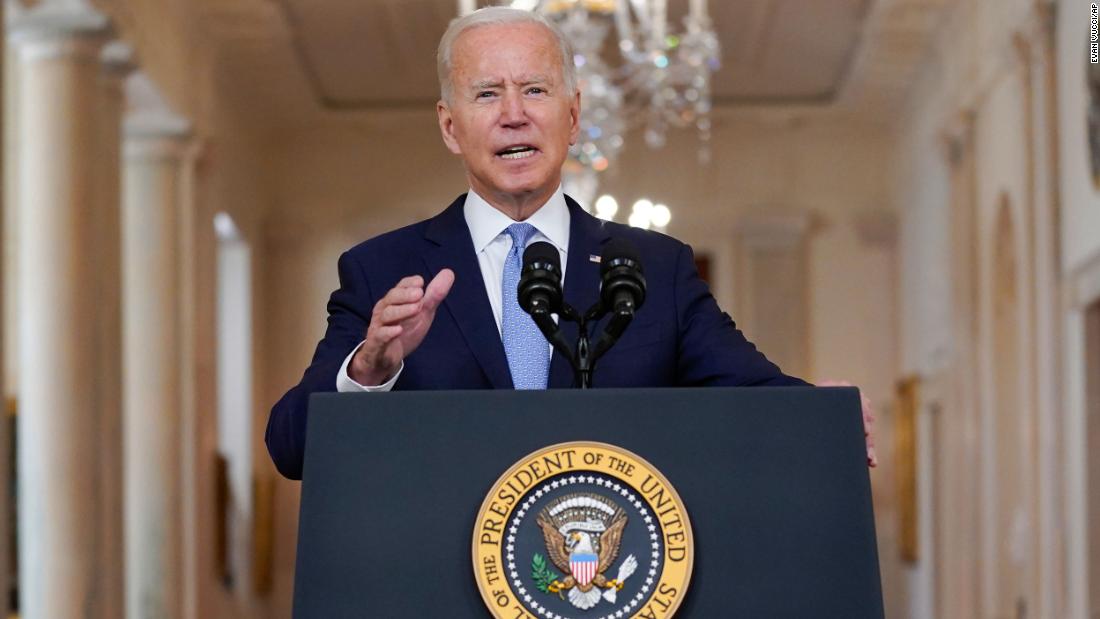The President defended the chaotic withdrawal from Afghanistan, saying the US needs to be protected against current threats, not ‘the threats of 2001’
Biden, in defending a decision that has drawn scrutiny for its execution, said the real decision in Afghanistan was “between leaving and escalating,” framing his choice to withdraw troops as the only option aside from surging more forces to the country.
“I was not going to extend this forever war, and I was not extending a forever exit,” he said.
The President contended that the US military was prepared to deal with all those events, even though he himself has admitted that the US was caught off-guard by the quick collapse of the Afghan army.
“This is the way the mission was designed. It was designed to operate under severe stress and attack, and that’s what it did,” Biden said.
A day after leaving Secretary of State Antony Blinken and US Central Command Commander Gen. Kenneth “Frank” McKenzie to speak in the hours after the final military plane left the country, Biden addressed the American people about his decision not to extend the US military presence in Afghanistan past the end of the month. Earlier on Tuesday morning, the President first met with his national security team for a briefing on Afghanistan in the Situation Room.
Biden paid tribute to the service members who were deployed to handle the withdrawal, including the 13 who died in the terrorist strike and praised their comrades who finished the mission.
“For weeks they risked their lives to get American citizens, Afghans who helped us, citizens of our allies and partners and others on board planes and out of the country. And they did it facing the crush of enormous crowds seeking to leave the country,” Biden said.
“Their view was that ending our military mission was the best way to protect the lives of our troops, and secure the prospects of civilian departures for those who want to leave Afghanistan in the weeks and months ahead,” Biden added.
He thanked the final US forces serving in the country for executing the “dangerous retrograde from Afghanistan as scheduled,” with no further loss of American lives.
While the President delivered an address to announce the initiation of the US withdrawal from Afghanistan earlier this year, the Biden administration left Monday’s full withdrawal announcement to McKenzie.
The CENTCOM commander on Monday acknowledged that the US military “did not get everybody out that we wanted to get out.”
“But I think if we’d stayed another 10 days, we wouldn’t have gotten everybody out that we wanted to get out and there still would’ve been people who would’ve been disappointed with that. It’s a tough situation,” he added.
As of Monday, more than 122,000 people had been airlifted from Hamid Karzai International Airport in Kabul since July, Pentagon spokesman John Kirby told reporters, including 5,400 Americans.
And in the 24 hours leading up to Monday morning, 26 military C-17 aircraft lifted off from Kabul carrying 1,200 evacuees, according to Gen. Hank Taylor, the deputy director of the Joint Staff for Regional Operations. In total, 28 flights departed from Kabul airport in that 24-hour window, Taylor said.
A senior State Department official said the department believes there are fewer than 250 American citizens currently in Afghanistan — and Blinken said Monday that number may be closer to 100 — who may wish to leave, as US officials stressed a Taliban commitment to let Afghans leave the country after the US and allies left. The State Department official put the number of American citizens who have left the country through evacuation flights or other means closer to 6,000.
“We’re trying to determine exactly how many. We’re going through manifests and calling and texting through our lists,” Blinken said in remarks at the State Department.
The State Department no longer has any diplomats in Afghanistan and has moved its diplomatic mission in the country to Doha, Qatar, Blnken said. He added that the diminished US presence in Afghanistan is not necessarily the end of US commitment there.
The top US diplomat noted that there are residents of Afghanistan who have US passports who are trying to determine if they should leave.
“Our commitment to them, and to all Americans in Afghanistan, and everywhere in the world, continues,” Blinken said.
Biden has said he intends to hold the Taliban accountable to their commitment that those seeking to leave the country will be able to do so safely.
On Monday, White House officials said the President is continuing the hunt for terrorists in Afghanistan, telling his military commanders to “stop at nothing” to avenge the deaths of the 13 US service members at Kabul airport.
This is a breaking story and will be updated.
CNN’s Jeff Zeleny, Betsy Klein, Barbara Starr, Oren Liebermann, Jennifer Hansler, Nicole Gaouette and Jason Hoffman contributed to this report.
![]()


